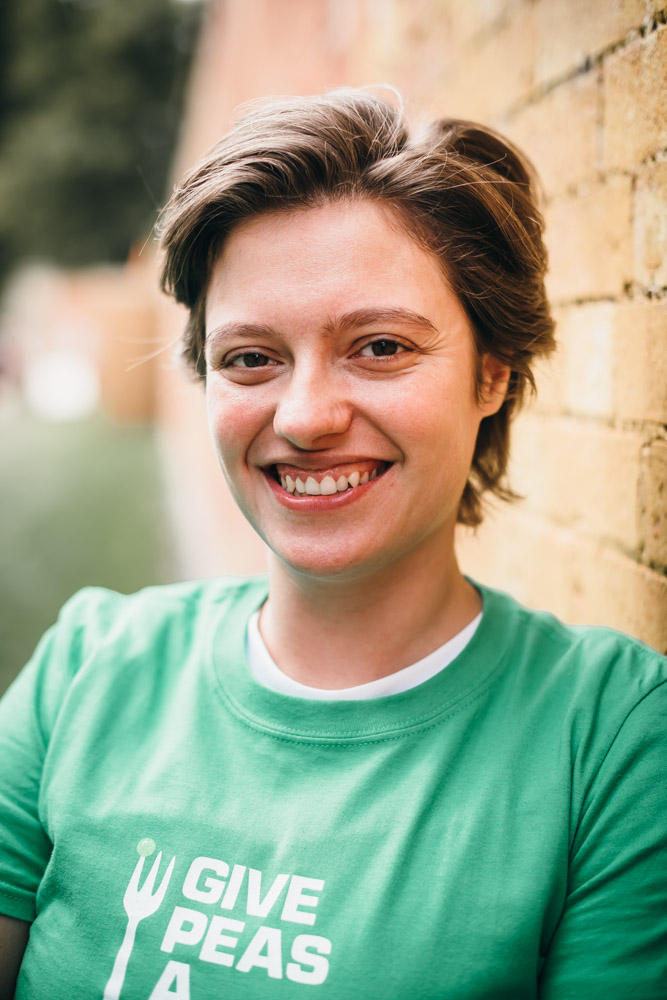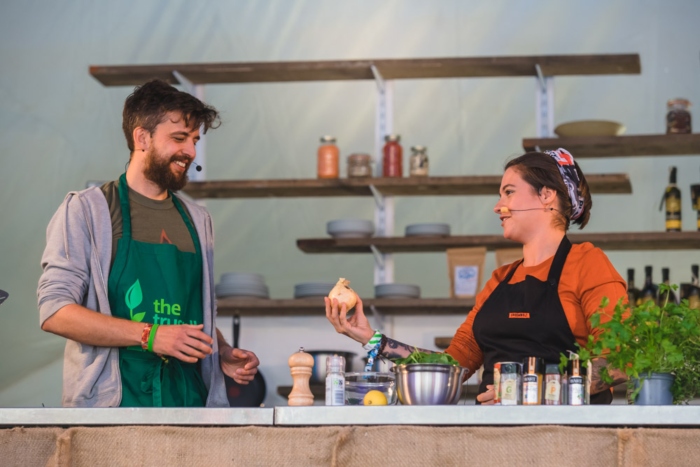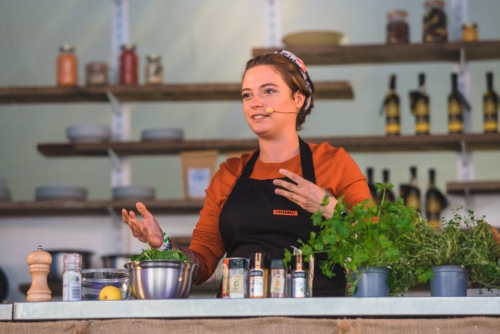'Cooking demonstrations in churches? Brilliant!'
Jack Monroe is an award winning cookbook author and blogger who specialises in budget recipes and campaigns on issues of poverty and hunger. At this year's Greenbelt Jack shared recipes from her latest book Cooking on a Bootstrap, before talking foodbanks, campaign tips – and why churches make ideal venues for budget cooking demonstrations.
Interview and photos by Alex Baker

At Greenbelt 2018 you did a couple of Cooking on a Bootstrap demonstrations. Would you like to see churches offering budget cooking demonstrations?
Yes, I would very much like to do this in churches up and down the country. I do a lot of work with foodbanks, and we do ad hoc cookery lessons. Where churches are places where foodbanks tend to be situated, I think that they would be perfect as a base for cookery classes. Most churches have well equipped kitchens that they could happily run cookery courses from. They have large tables and stoves from which I would happily help run cookery classes. When I was a teenager I used to help cook at the Alpha Course at my local Baptist church.
The church has a great outreach into the community and is usually well situated for finding people in need. I remember from my own church congregations that churches tend to have their fair share of people who are vulnerable and in need, so I think offering budget cookery classes from church halls would be a brilliant place to start.

What’s your view on foodbanks?
I am a former foodbank user: I used my local foodbank, run by my local church, for about six months, and I think the work the churches and foodbanks are doing in the community to feed the needy is vital. It’s really disappointing that such a need has arisen in our modern-day society and isn’t showing any sign of abating. In fact, the number of people referred to foodbanks gets higher every year.
I think churches need to address the structural reasons for poverty in their community as well as meeting the needs of the people who come through their door. It’s admirable that people are feeding the hungry and I’m really glad and grateful that people are, but if you’re feeding the hungry and then going and voting for the policies that deprive them of their benefits then you might want to have a word with yourself about your right hand talking to your left hand.
Tell us about your general campaigning – what’s worked well? What can churches learn from your experiences?
I’ve done a lot of campaign work over the years. I managed to force a petition on the use of foodbanks in the Houses of Parliament overnight, which was quite an ask. I did that in conjunction with the Trussell Trust and Unite with a three-pronged approach, where we all launched the same petition at the same time. We made public stories of people we knew, in my case myself: how poverty can impact, how foodbank use is on the rise. That forced a campaign in the Houses of Parliament in 2013 that really raised awareness of foodbank use in Britain.
We’ve not stopped since. We just keep going, encouraging people to donate to foodbanks.
I think all the successful campaign work I have done has been done with storytelling at its heart. If you want to raise awareness of an issue or change hearts and minds around an issue it is very powerful to do so by giving someone a platform to tell their story. Because once they can find someone they can relate to and they go, “oh, this could happen to me” or “oh, this is a real person, these cuts to benefits, or austerity or these words that politicians throw around are actually leaving people hungry, homeless or in some cases, dead”. That is a very powerful campaign tool.
Statistics are great but you need to front those statistics with someone’s really powerful story and then throw the statistics in to bolster it: “So this is one person’s devastating account and this is how many more people it applies to”.
That, I’ve found, is where people sit up and listen. And to polish it off at the end with a “this is what you can do to help”. There’s nothing worse than reading someone’s heart-rending account of their awful life and then feeling powerless to do anything about it. You make it really easy for people to help: “Here’s a link to a petition” or “here’s where you can donate” or “Here’s how to write to your MP”.
As a three-pronged approach, that really works for campaigning. I like to share these secrets because it would be really helpful if other people did campaigning. The more of us banging our drums, the better.

How would you like to see the language of poverty changed?
We could do better to recognise that poverty is a state that can be thrust on you through circumstances not of your own making. Some people are born into poverty, some are in generational poverty, some are in what I call “post-code poverty” – they don’t have the necessary services in their area which can help lift them out of poverty.
But some people also just have bad luck, their lives just don’t go the way they planned them to, they lose a job or someone falls ill or they’re made redundant. That fall into poverty is rapid. I think a lot of people think it won’t happen to them.
So educating people on where poverty comes from: it’s not always what you think of from TV shows like Benefits Street or Jeremy Kyle. Nice middle-class people can find themselves homeless through a small series of unfortunate circumstances.
I think telling people stories and educating them around the real reasons people fall into poverty is integral to changing the language used and the attitude towards poverty.
Would you consider standing in a future election?
Yes. I went to stand for election a couple of years ago. I quickly realised I had so much stuff going on. I was writing this book. I was doing a lot of talks about poverty up and down the country. In the off chance I had been elected, I wouldn’t have been able to give my constituents the time and the attention and energy they deserve for their parking permits and dog poo and letterbox issues.
It’s something I would love to do though.
It’s your second time at Greenbelt – what encourages you about it?
It is nice. One of the things I really love about Greenbelt is that it is a community of activists that crosses all denominations of church and those who’ve never been to church, but we’re all here, as well as wanting to have a nice time, to create a slightly better world. We want to leave the world a better place than when we found it.
It’s a great place to network and meet other people who also want to do that, to make the world a better place, who also want to help people, and it gives us a real opportunity to link up because we’re stronger when we’re in teams. It gives a really good opportunity to share ideas.
Alex Baker is a former sub-editor and movie reviewer of The Baptist Times who now works as a photographer
Do you have a view? Share your thoughts via our letters' page.
Baptist Times, 12/09/2018